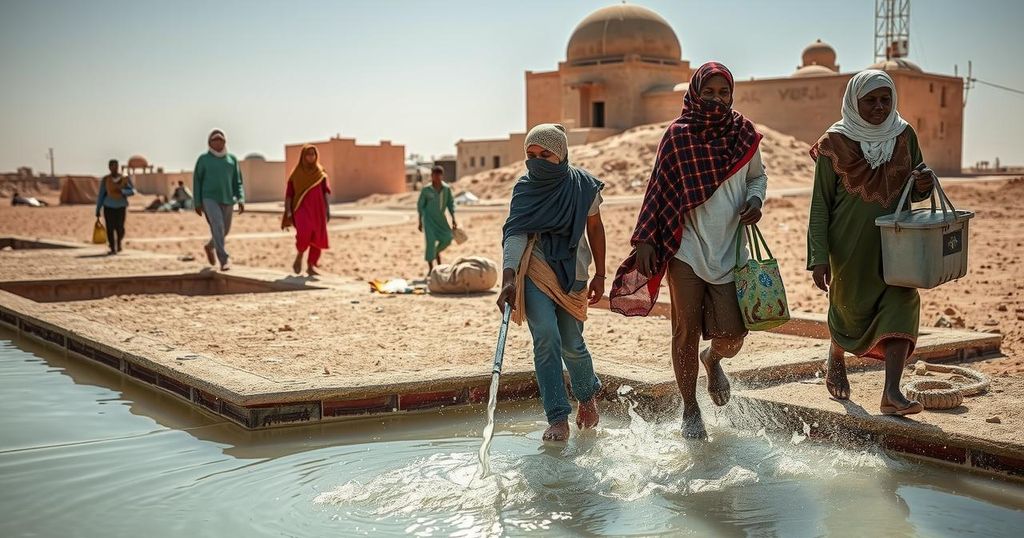Severe Water Shortages Plague Sudanese Refugees in Chad

Sudanese refugees in Chad, particularly in Tongori camp, are facing severe water shortages, forcing them to rely on contaminated sources. After being relocated from Adré camp due to tensions with local residents, many refugees suffer significant hardships. With limited basic services, organizations like the UNHCR are calling for urgent humanitarian intervention to assist over 600,000 Sudanese refugees in the region.
Sudanese refugees in Chad are grappling with severe water shortages, exacerbating their difficult living conditions. Aisha Adam Ishag, who fled the violence in El Geneina due to the ongoing conflict between the Sudanese Armed Forces (SAF) and the Rapid Support Forces (RSF), now lives in Tongori camp, where she struggles to access clean drinking water. Despite being allocated only 60 liters per day, Aisha and other refugee women are forced to seek water from contaminated sources, risking their health and well-being.
The relocation of new Sudanese refugees to Tongori camp by Chadian authorities, amidst existing tensions between refugees and local residents, has led to a dire situation lacking essential services. Originally from Adré camp, which provided closer access to water and medical facilities, Aisha and others now find themselves in a remote area without adequate humanitarian support. The Chadian government’s forced evacuation of these refugees has created additional conflict, as many refuse to relocate due to safety concerns and the scarcity of necessary resources.
Testimonies from other refugees underscore the harsh realities they face in Tongori camp. Fatima Adam Idris lamented the lack of services, indicating, “We have spent 12 months in the camp carrying water on our heads and we cannot bear more than that.” Similarly, Amira Mostafa revealed their desperation, noting that they often resort to fetching water from a less polluted valley, as water sourced from pipes is inadequate. As reported by the United Nations High Commissioner for Refugees (UNHCR), Chad currently hosts more than 600,000 Sudanese refugees, calling for urgent intervention to address their critical needs.
Amidst these challenges, the UNHCR’s plea highlights the pressing humanitarian crisis and the need for immediate action to support these vulnerable populations.
The plight of Sudanese refugees in Chad has been a growing concern, particularly following the conflicts that have erupted since 2003 in Darfur and more recently in April 2023. Many of these individuals have fled violence and persecution in their homeland only to encounter significant hardships in exile. Water scarcity is one of the most pressing issues faced by these refugees, affecting their health and quality of life. Relocations mandated by authorities often exacerbate the lack of access to basic necessities such as clean water, food, and medical care, creating potential conflicts with local communities as well. The UNHCR has raised alarms regarding the dire conditions in camps, calling for international attention and assistance.
The situation of Sudanese refugees in Chad is critical, marked by significant hardships, particularly in accessing potable water. Aisha Adam Ishag’s experiences reflect a broader crisis affecting thousands of refugees who have fled violence in Sudan. The forced relocations to Tongori camp have left many in dire conditions, with limited basic services and deteriorating living environments. The urgent call by the UNHCR seeks to draw attention to the plight of these individuals and ensure that necessary aid reaches those in desperate need.
Original Source: www.dabangasudan.org







